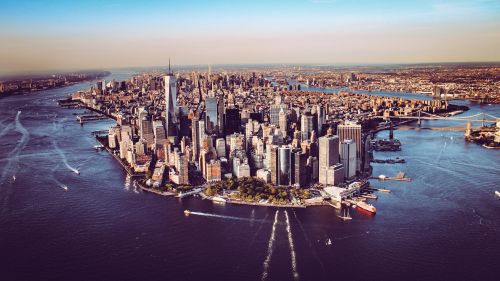New York City's Global Experience Builds the Case for City Diplomacy

The New York experience demonstrates how we can work together through city diplomacy to create meaningful impact.
New York City
The megatrend of urbanization is fundamentally transforming the role of cities on the global stage. According to the United Nations and the International Organization for Migration, three million people around the world move to cities every week. By 2030, cities will be home to 60 percent of the world’s population, and a projected 706 cities will have at least one million residents.
Because of these shifts, city governments now represent more people than at any other time in history. Local leaders are increasingly taking center stage in global affairs as a core part of their service to constituents, applying creative and innovative approaches to pressing sustainability challenges that transcend national borders.
And let’s face it, local leadership is needed more urgently than ever. National governments from the United States to Brazil and throughout the world are actively abdicating their responsibility on daunting systemic issues like climate change, migration, and economic inequality. Given these realities, input from diverse voices becomes imperative. While local government cannot be a replacement for national leadership, cities must be part of the conversation to find effective solutions to current challenges.
New York City’s experience shows how cities are advancing a new paradigm of international affairs by bringing their unique expertise and perspective honed by practical frontline experience to global challenges. This sustained engagement from local governments in international affairs, or what we call city diplomacy, is crucial to achieving the 2030 Agenda for Sustainable Development and its goals to uplift people, prosperity, and the planet.
As the host city to the United Nations, New York City is deeply invested in the success of the Sustainable Development Goals (SDGs), adopted by world leaders in 2015. However, our work to promote equity and inclusion through structural change on the local level began well before world leaders adopted the SDGs.
Education initiatives launched by the administration of Mayor Bill de Blasio represent this commitment to fairness and equal opportunity for all. In 2014, NYC launched the largest and most ambitious expansion of pre-K of any city in the nation’s history. This year, almost 66,000 children in New York City will receive free, full-day, high-quality pre-kindergarten, an initiative proven to improve children’s long-term educational outcomes.
New York City has also led the way in supporting immigrants and refugees on the local level. More than half the 8.6 million New Yorkers, including myself, are foreign-born. Immigrants fill our five boroughs with diversity, innovation, and energy, and it is essential that everyone, no matter where they come from, has the opportunity to be included in the life of the city to the fullest extent possible. To help achieve that, the IDNYC program was launched to give New Yorkers equal access to city services, regardless of immigration status. In addition to serving as a government-issued ID, the card allows city residents to use the public library and visit cultural institutions, among other benefits.
Given the commitment to fairness in the implementation of our local agenda, New York City was poised to act when world leaders adopted the SDGs at the United Nations in 2015. The SDGs laid out concrete global goals for climate security, safe and orderly migration, and social and economic equality for all. Many of these priorities were outlined months earlier in NYC’s sustainable development framework, OneNYC.
Changes to US federal leadership in 2016 made NYC’s stalwart engagement on these issues even more important. The United States withdrew from the Paris Climate Agreement in June 2017. The very next day, recognizing the critical role that cities play in addressing climate change, Mayor de Blasio took practical action by signing an executive order committing NYC to the principles of the Paris Agreement, inspiring hundreds of cities around the country to do the same. We were joined by US cities of all sizes and regions and soon became the first city in the world to publish a Paris Agreement-compliant plan in October 2017.
When our national government abandoned negotiations for the Global Compact for Migration in December 2017, New York was already at the forefront of global migration advocacy with innovative policies like IDNYC. Our experience allowed us to assemble a coalition of more than 50 domestic and international cities to advocate for the inclusion of local voices in the Compact, and to continue to give input to its ongoing implementation.
While local governments do not decide who comes to our cities, we are responsible for the well-being and inclusion of our new arrivals, from access to education and health care to their relationships with law enforcement. Cities have a responsibility to make sure our new neighbors can access the resources needed to flourish.
As NYC’s story demonstrates, city engagement is essential to ensuring that global goals for sustainability are achieved. Furthermore, city diplomacy is not just an activity for large cities like NYC: cities of all sizes and geographies bring insights and energy to this movement. That’s what makes the SDGs especially helpful, as they serve as a common language to discuss complex policy topics with international partners.
Recognizing the power of the SDGs, New York City launched its Global Vision | Urban Action platform in 2015 to share best practices across borders. With this program, we’ve brought NYC’s diplomatic corps — the largest in the world — out of the UN headquarters in midtown Manhattan and into our local communities across the five boroughs, where these experts witness firsthand how NYC agencies are putting sustainability policies into practice. Discussing complicated issues through a common framework—the SDGs—provides an extraordinary opportunity for all involved. I have witnessed representatives from numerous countries come together through our programming to address challenging topics, from gender-based violence to sustainable waste management, through the lens of the SDGs.
Given the indispensable role that local governments play in achieving the global goals, and identifying the need for a mechanism that allows cities to interact with the United Nations in a substantive way, New York City launched the Voluntary Local Review (VLR) as an evolution of our Global Vision | Urban Action program in 2018. By doing so, we became the first city in the world to report directly to the United Nations on our local progress toward the Sustainable Development Goals. Modeled after the Voluntary National Reviews submitted by member states of the UN, our award-winning VLR showcases New York’s advancement toward the goals, identifies areas where we can learn from others, and addresses remaining challenges.
The VLR has generated extraordinary interest by cities large and small. Cities around the world, including Helsinki and Milan, have since committed to reporting their own progress to the UN. The VLR gives cities a tool to participate in international dialogues and affirms that regardless of where national governments may stand, local leaders are determined to make their voices heard and be accountable to their constituents for progress toward the SDGs.
We believe that every city can connect its local work with global goals. New York City is therefore calling on all cities, no matter their size or location, to join us in committing to the VLR process. Our experience provides a blueprint that can be applied elsewhere, and the process is accessible and simpler than it might seem.
Our collective efforts can go a long way toward achieving the Sustainable Development Goals by 2030, but only if we act now, as we have limited time to respond to these critical global challenges. The New York experience demonstrates how we can work together through city diplomacy to create a meaningful impact.

